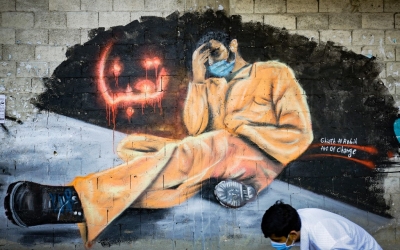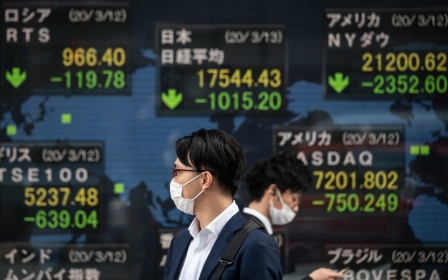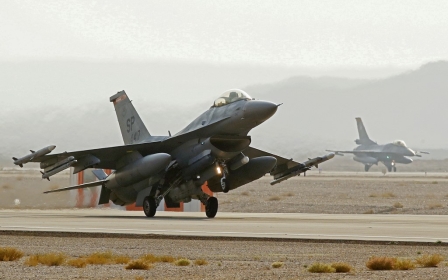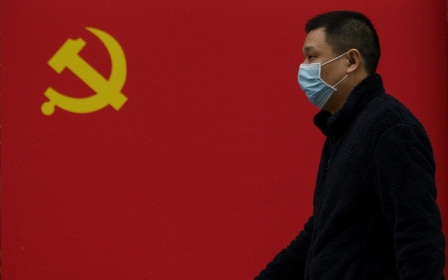Coronavirus: As the West turns inwards, another crisis hits the Middle East
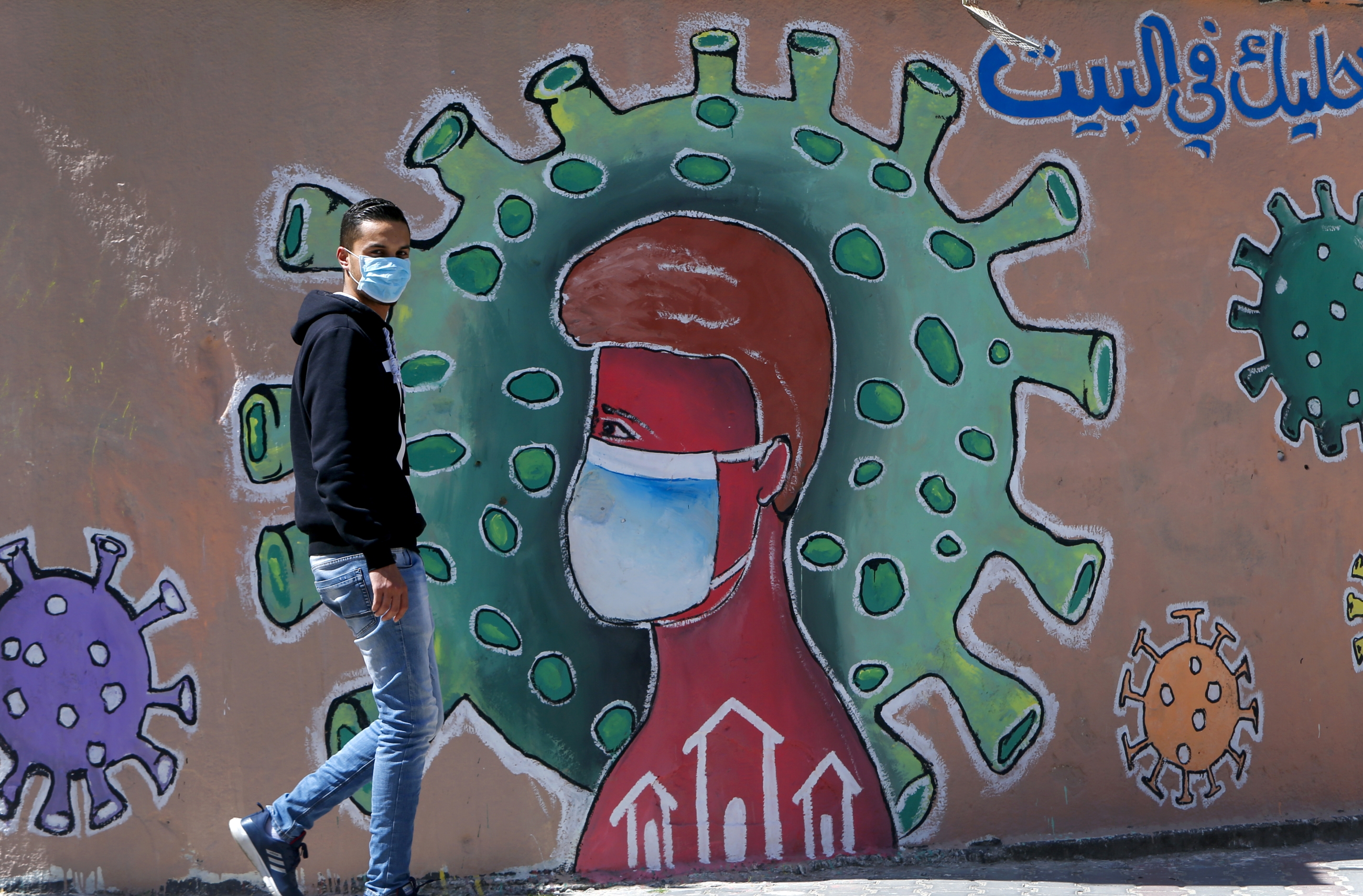
Who will suffer most from the geopolitical fallout of the coronavirus pandemic? Will it hasten the decline of the West, and will China, ironically, benefit most - despite the disease starting there?
Where will the Middle East land between these two economic superpowers? Will the demand for oil in the East make up for what could be a permanent fall in consumption among countries in the West?
Will President Xi Jinping’s Belt and Road Initiative get bogged down by debt or continue to be welcomed in trade-hungry countries in Asia and Europe?
Many think tanks and books circle these questions, while a few are refreshingly forthright. One is Bluster, a devastating attack on US President Donald Trump and his new friend, Saudi Crown Prince Mohammed bin Salman (MBS).
Far from contributing to greater stability in the Middle East, the pair have done the opposite, says author Peter Neumann, founder of the International Centre for the Study of Radicalisation at King’s College London.
New MEE newsletter: Jerusalem Dispatch
Sign up to get the latest insights and analysis on Israel-Palestine, alongside Turkey Unpacked and other MEE newsletters
Reckless foreign policy
Saudi Arabia has repeatedly used its privileged relationship with the US to advance its own, often misguided, interests in the region, Neumann writes. He adds: “Practically every major foreign policy decision by Crown Prince Mohammed bin Salman has increased sectarian tensions, heightened the risk of regional conflict, and created the potential for more terrorism.”
The principal outcomes of MBS’s “reform agenda” were “not moderation and modernisation, but increased authoritarianism and progressively reckless foreign policy”.
The author references media investigations revealing that jihadists were recruited into Saudi-led-coalition-sponsored militias to fight the Houthis. “Whatever the outcome of the conflict, thanks to the Saudi-led campaign, Yemen’s jihadists will be among the best-funded and best-equipped in the world,” Neumann notes.
As the worldwide coronavirus crisis preoccupies most governments, Western consumers of mainstream news media hear little of the Middle East
He also points out that Trump initially supported the Saudi-led blockade of Qatar, apparently not realising it was the location of a major US base. Trump backed down after pressure from then-Secretary of State Rex Tillerson and then-Secretary of Defence James Mattis, both of whom subsequently left their positions.
Trump abandoned traditional US attempts to promote democracy in the Middle East - or indeed, anywhere in the world. In his latest book, The Dragons and the Snakes, David Kilcullen, former US counterterrorism adviser and now university professor in his native Australia, suggests that is not a bad thing, given the West’s record.
The West, he recommends in his book, should stop attempting to “dominate rivals and spread democracy by force” and focus, instead, on preventing potential adversaries from “dominating” the West.
Culmination point
Invasions and military force have not been the best way to get rid of dictators and authoritarian regimes. That was a lesson most people could have learned a long time ago - but not, it seems, leaders in the West. You cannot “drop democracy from 14,000 feet”, warned former British Prime Minister David Cameron, before asking the RAF to do precisely that in 2011 and bomb Libya in air strikes that led to the fall of Muammar Gaddafi and a violent conflict that is still raging.
Kilcullen picks his “culminating point” for Western military power in its conventional post-Cold War form, one marking the “peak of the high-tech, intelligence-led, precision-strike model of battlefield dominance” - the beginning of the end of unchallenged Western military supremacy that had “spooked the Chinese, humiliated the Russians, scared the North Koreans, and given the Iranians pause”.
It was the bombing in March 2003 on the Dora Farms complex outside Baghdad. It was supposed to be a “decapitation” strike against Saddam Hussein and his sons, Uday and Qusay. They were not there.
As the US and its Western allies remained “locked on the Middle East”, as Kilcullen puts it, their adversaries learned what weapons to use - cyberattacks and drones, for example. Iran, meanwhile, became the biggest beneficiary of the Iraq War and the Arab Spring, enjoying “de facto control of a corridor from the Iranian border with Afghanistan all the way to the Israel frontier at the Golan Heights”.
Boosting protectionism
Many commentators have suggested that the coronavirus pandemic will lead to more governments questioning the benefits of globalisation, giving a boost to protectionist tendencies - especially in the US, where they have been encouraged by Trump’s rhetoric.
An escalation of the US-China trade war would have huge implications for American consumers. China is the world’s largest manufacturer of computer products and smartphones, according to most estimates.
It also accounts for more than 90 percent of the US market in antibiotics and a significant amount of other medicines, prompting US claims that China intends to weaponise drugs as an increasingly aggressive use of soft power, alongside cyber attacks, investments in mining in Africa and Afghanistan, and infrastructure projects, notably the Belt and Road Initiative.
Europe, meanwhile, is losing confidence, with the United Kingdom - historically the Gulf’s best friend - in particular suffering from post-Brexit and post-imperial withdrawal symptoms, looking for a new role and place in the world. Russia’s economy is weak and the military not as strong as President Vladimir Putin likes to make out.
As the worldwide coronavirus crisis preoccupies most governments, Western consumers of mainstream news media hear little of the Middle East, including Israel, bogged down in seemingly endless political haggling; Lebanon in turmoil; Iraq, Syria and Turkey.
I think again of statistics and demographic trends that have worried me for many years. About 60 percent of the population of Arab countries, including Saudi Arabia, is under 25. Around half of Iranians are under 30, and 40 percent of them are jobless. The population of countries in the Middle East and North Africa (MENA) region is expected to double by 2050.
Population explosion
In 2014, a little-known agency in Britain’s Ministry of Defence - its Development, Concepts and Doctrine Centre - published a document called “Global Strategic Trends - Out to 2045”. By then, the population of the MENA region was expected to increase by 230 million to approximately 670 million, with the populations of some countries, including Yemen, almost doubling during this period.
In 2012, the study noted, North African youths were 3.4 times more likely to be unemployed than adults. It warned that problems in trying to meet a growing sense of personal ambition among people of working age, and in providing work for them, were likely “to add to growing civil discontent in MENA out to 2045, constituting some of the most likely causes of civil unrest”.
Governments in the Middle East, like those everywhere else in the world, face unprecedented economic turbulence. But they are likely to face worse problems and confront greater dangers if they ignore the needs and potential frustrations of their young populations.
The views expressed in this article belong to the author and do not necessarily reflect the editorial policy of Middle East Eye.
Middle East Eye delivers independent and unrivalled coverage and analysis of the Middle East, North Africa and beyond. To learn more about republishing this content and the associated fees, please fill out this form. More about MEE can be found here.




